- Home
- Gustave Aimard
The Indian Chief: The Story of a Revolution Page 10
The Indian Chief: The Story of a Revolution Read online
Page 10
CHAPTER X.
THE AMBASSADORS.
The paper which the peon handed to Captain de Laville, and which causedhim to feel such emotion, only contained one name; but it was a namewell known at Guetzalli--that of the Count de Prebois Crance. TheGuetzallians had heard vague rumours of the French expedition formed atSan Francisco for the purpose of working the inexhaustible mines of thePlancha de Plata. They knew, too, of the company's arrival at Guaymas;but since then they had received no news, and were completely ignorantof the events that had occurred.
The captain had not the remotest idea that the Count de Prebois was theleader of that expedition; but, from several words Louis had let fallduring his stay at the hacienda, he suspected him of fostering certainprojects against the Mexican Government. This was the reason why, onreceiving the paper, his first impulse was to exclaim, "He here! Whatcan be the matter?"
He proceeded at once to the count, persuaded that the latter, outlawedfor some reason by the Mexican Government, had come to demand an asylumfrom him. Colonel Suarez' unexpected visit coincided strangely with thecount's arrival, and confirmed him in his notion; for he supposed, withsome appearance of truth, that the colonel was ordered to enforce on himnot to receive the exile, or, if he received him into the colony, tohand him over at once to the Mexican authorities. Fearing lest he mightcommit some error prejudicial to the count, he had hurriedly left thecolonel alone, in order to come to an understanding with his compatriot,as from the first moment he had resolved not only not to surrender him,but not to abandon him if he claimed his aid.
The reader sees that, although the captain's hypothesis was false, itbordered on the truth in several points.
Don Louis and Valentine, seated on butacas, were smoking and talkingtogether, while drinking, to refresh themselves, a decoction oftamarinds, when the door opened, and the captain appeared. The three menshook hands affectionately, and then de Laville, making the others asign to sit down again, began the conversation at once.
"What good wind brings you to Guetzalli, my dear count?" he said.
"Hum!" the latter said. "If you asked what _cordonazo_, you would benearer the truth, my dear De Laville; for never has a more terriblehurricane assailed me than threatens at this moment."
"Oh, oh! do tell me about it I need hardly say, I suppose, I am quite atyour service."
"Thank you; but, before all, one word. Who has taken the Count deLhorailles' place in the government of the colony?"
"Myself," the young man modestly replied.
"By Jove! I am delighted to hear that," the count said frankly, "for noone was more worthy than you to succeed him."
"My dear sir!" he said in confusion.
"On my word, captain, I tell you honestly what I think: all the worse ifit wounds you."
"Far from that," the young man remarked with a smile.
"Then all is for the best. I see that my interests will not beimperilled in your hands."
"You may feel assured of it."
"Permit me to introduce to you my most intimate friend, my fosterbrother, whose name you must often have heard, and with whom I shouldbe glad for you to be better acquainted: in one word, he is the Frenchscout whom the Indians and Mexicans have surnamed the 'Trail-hunter.'"
The captain rose hurriedly, and held out his hand to the hunter.
"What!" he said with considerable emotion, "Are you Valentine Guillois?"
"Yes, sir," the hunter replied with a modest bow.
"Oh, sir!" the young man exclaimed warmly, "I am delighted to formyour personal acquaintance. Everybody respects and cherishes you here,because you maintain that title of Frenchman, of which we are all soproud. Thanks, count, thanks; and now, by heavens, ask of me anythingyou please, and I shall not know how to repay the pleasure you havecaused me.
"Good heavens!" the count replied; "for the present I will only ask youa very simple matter. You will soon be visited, if he has not alreadyarrived, by an aide-de-camp of General Guerrero."
"Colonel Suarez?"
"Yes."
"He is here."
"Already?"
"He has only been here an hour."
"He has told you nothing?"
"Not yet: we have not spoken together."
"All the better. Would you mind placing us where it would be possiblefor us to overhear your conversation, and not be seen?"
"That is very simple. Adjoining the room where he is waiting for me is arecess, only covered by a curtain; but we can manage it better still."
"How?"
"Does he know you?"
"Me?"
"Yes. Does he know you by sight?"
"No."
"You are sure of that?"
"Quite."
"Nor this gentleman either?"
"Not the least in the world."
"Very good: let me manage it. I will arrange it all; and now to talk ofyourself."
"It is unnecessary."
"Why so?"
"Because it is probable the colonel will tell you more than I could."
"Ah, ah! then you fancy he has come on your account?"
"I am certain of it."
"Very good. Now, do not trouble yourself about anything, but let mearrange it all."
"Agreed."
"I will be with you again directly."
And he left the room.
The colonel was still in the same position as when we left him. He hadlighted a considerable number of husk cigarettes, and the nicotine wasbeginning to act gently on his brain; his eyelids were drooping; inshort, he was just on the point of going to sleep. The sudden entranceof the captain aroused him from this state of torpor, and he raised hishead.
"Pray pardon my having left you alone so long," the young man said; "butan unforeseen event----"
"You are quite excused," the colonel answered politely. "Still I shouldhave been charmed had you thought of advising the Count de Lhoraillesof my arrival, for the affair that brought me here admits of no delay."
The captain regarded the Mexican with surprise.
"How!" he said, "the Count de Lhorailles?"
"Certainly: it is to him alone that I must communicate the dispatches ofwhich I am bearer."
"But the Count de Lhorailles has been dead for nearly a year. Were younot aware of the fact?"
"My word, no, sir, I confess."
"That is extraordinary; yet I remember having sent a courier express tothe Governor of Sonora to inform him of this death, and announce to himat the same time that the choice of my countrymen had fallen on me totake his place."
"It is probable, then, either that your courier did not obey his orders,or was assassinated on the road."
"I fear it."
"So that you, sir, are now captain of the colony of Guetzalli?"
"Yes, sir."
"You are very young to occupy so difficult a post."
"Colonel," de Laville answered with a slight hauteur, "we Frenchmen donot measure men by age or height."
"It is frequently wrong; but no matter, that does not concern me. Withwhom have I the honour of speaking?"
"With Don Carlos de Laville."
The colonel bowed.
"I will, then, with your permission, caballero, communicate mydispatches to you."
"A moment, sir," the captain said quickly. "I cannot listen to youunless I have by my side two of the principal men in the colony."
"For what object?"
"That is the law."
"Do so, then."
The captain struck a bell, and a peon entered.
"Ask the two gentlemen waiting in the green room to come here," he said.
The peon went out.
"What! the two persons who are waiting?" the colonel said suspiciously.
"Yes. As I presumed, colonel, that you were the bearer of dispatches,I warned these two persons in order to detain you as short a time aspossible."
"In that case permit me to return you my thanks, for I am reallyterribly pressed for time."
; At this moment the door opened, and the count and Valentine came in.The colonel bent a piercing glance upon them, to try to discover withwhat sort of men he would have to deal; but it was impossible to readanything in their cold and rigid countenances, which seemed hewn out ofmarble.
"Gentlemen," the captain said, "Colonel Don Suarez, aide-de-camp toGeneral Don Sebastian Guerrero, military governor of the State ofSonora. Colonel Suarez, two of my countrymen."
The three men bowed stiffly.
"Now, gentlemen," the captain continued, "pray be seated. The colonel isthe bearer of dispatches he wishes to communicate to us, and they areprobably important, as the colonel has not stopped even between Piticand this place. We are ready to listen to you, colonel."
Like all men accustomed to double dealing and underhand schemes, thecolonel possessed an infallible instinct for scenting treachery. In thepresent case, although all was being done ostensibly with the greatestfrankness, and he was a thousand leagues from suspecting the truth,he guessed that he was being cheated, although it was impossible toperceive the secret object they had in view. Still he had no subterfugeshe could employ: he must obey his instructions, and he decided on doingso, much against the grain, after bending on the two strangers a secondglance, by which he sought to read their very hearts' thoughts, butwhich had no better result than the first.
"Gentlemen," he said, "you have doubtlessly not forgotten the numberlessacts of kindness with which the Mexican Government has overwhelmed you."
"Overwhelmed is the word," de Laville interrupted him with a smile. "Goon, colonel."
"The Government is ready to make still greater sacrifices for you, ifnecessary."
"_Caspita!_" the young man again interrupted him, "we will spare it thetrouble. The kindnesses of the Mexican Government generally cost us verydearly."
A discussion commenced in this tone of raillery had not the slightestchance of resulting in an amicable arrangement. Still the colonel didnot break down, his mind was made up. He cared little for the result,for he knew perfectly well that those who sent him would not hesitate todisavow him according to circumstances.
"Hum!" he said, "the following proposal is made you."
"I beg your pardon, colonel, but before telling us the proposals,perhaps it would be better to explain to us the reasons that induce theGovernment to offer them," de Laville observed.
"Good heavens, sir! you must know the reasons as well as I do."
"Pardon me, but we are completely ignorant of them, and would feelgreatly obliged by your telling them to us."
The count and Valentine were as motionless as statues, and these twogloomy faces disturbed the colonel in an extraordinary manner.
"The reasons are very simple," he stammered.
"I do not doubt it, but be good enough to mention them."
"This letter," he said, handing a sealed paper to the captain, "willexplain the matter fully."
De Laville took the paper, read it through hurriedly, and then crumpledit up passionately in his hand.
"Colonel," he then said in a firm voice, "the Government of Sonoraforgets that the colony of Guetzalli only contains Frenchmen; that is tosay, no traitors. We have retained our nationality, although establishedin this country; and if the Mexican laws will not protect us we willappeal to our minister at Mexico, and, if necessary, contrive to protectourselves."
"These threats, sir----" the colonel interrupted.
"They are not threats," the young man continued energetically. "GeneralGuerrero insults us by inviting us not merely to abandon one of ourcountrymen, who is in every respect worthy of our support, through hisloyalty, courage, and nobility of character, but also by proposing to usto hunt him down like a wild beast, and deliver him over. The generalmenaces us with outlawry if we assist the count, whom he brands as apirate and a rebel. Let him do so if he please. This letter you havehanded me will be carried by a sure man to Mexico, and handed to ourminister, with a detail of all the annoyances we have suffered from theMexican authorities ever since our settlement here."
"You are wrong, sir," the colonel answered, "to take the proposal madeyou in this way. The general is very well disposed toward you. I doubtnot that he will consent to grant you great advantages if you willonly obey him. What do you peaceful colonists care for this rebelliouscount, whom I dare say you never heard of? Your own interests demandthat you should turn against him. This man is a villain, to whom nothingis sacred. Since his arrival in our country he has committed the mostodious crimes. Take my advice, sir; do not obstinately choose a wrongpath, but prove to the Government all your gratitude for the favours youhave received by abandoning this villain."
The captain had listened calmly and coldly to the Mexican's longdiatribe, holding in check by a glance the count and his companion, whofound it very difficult not to burst out and treat this man in the wayhe deserved. When the colonel at length ceased, the captain looked athim with sovereign contempt.
"Have you finished?" he said dryly.
"Yes," the other answered in confusion.
"Very good. Now, thanks to Heaven, we have nothing more in common. Begood enough to mount your horse and leave the colony immediately. As forGeneral Guerrero, tell him that I will give him an answer myself."
"I will retire, sir. Do you intend to give this answer soon?"
"Within twenty-four hours. Begone!"
"I will report our conversation word for word to the general."
"I shall be glad of it. Good-by till we meet again, sir."
"What! do you intend to take your answer personally?"
"Perhaps so," de Laville answered mockingly.
The colonel went out all abashed by his reception, and followed by thethree men, who did not let him out of sight, and walked by his side,so as to prevent him communicating with anyone. His horse was waitingin the courtyard, held by one of the orderlies. The colonel mounted androde off rapidly, for he was anxious to leave the colony. On reachingthe isthmus gate he, however, turned round, and looked back for sometime.
"Who can those two men be?" he muttered.
And he dug his spurs in his horse's sides. When he had disappeared inthe windings of the road the captain seized Don Louis' hand, and pressedit affectionately.
"And now, my dear count," he said to him, "speak. What can I do for you?"

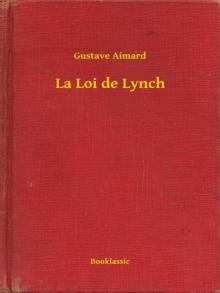 La loi de lynch. English
La loi de lynch. English The Guide of the Desert
The Guide of the Desert The Trail-Hunter: A Tale of the Far West
The Trail-Hunter: A Tale of the Far West The Pirates of the Prairies: Adventures in the American Desert
The Pirates of the Prairies: Adventures in the American Desert The Treasure of Pearls: A Romance of Adventures in California
The Treasure of Pearls: A Romance of Adventures in California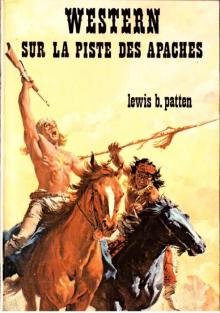 Les outlaws du Missouri. English
Les outlaws du Missouri. English Les trappeurs de l'Arkansas. English
Les trappeurs de l'Arkansas. English The Border Rifles: A Tale of the Texan War
The Border Rifles: A Tale of the Texan War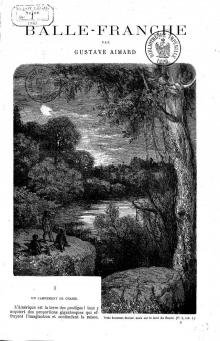 Balle-Franche. English
Balle-Franche. English The Queen of the Savannah: A Story of the Mexican War
The Queen of the Savannah: A Story of the Mexican War The Red Track: A Story of Social Life in Mexico
The Red Track: A Story of Social Life in Mexico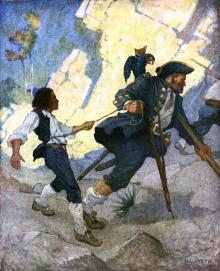 La fièvre d'or. English
La fièvre d'or. English The Pearl of the Andes: A Tale of Love and Adventure
The Pearl of the Andes: A Tale of Love and Adventure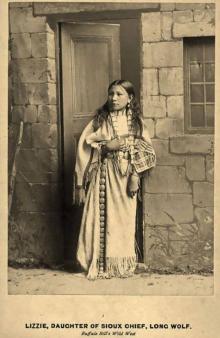 Les fils de la tortue. English
Les fils de la tortue. English The Indian Chief: The Story of a Revolution
The Indian Chief: The Story of a Revolution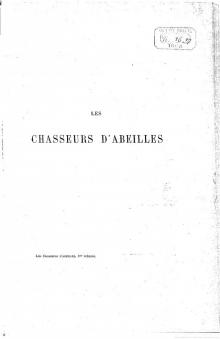 Les chasseurs d'abeilles. English
Les chasseurs d'abeilles. English The Adventurers
The Adventurers